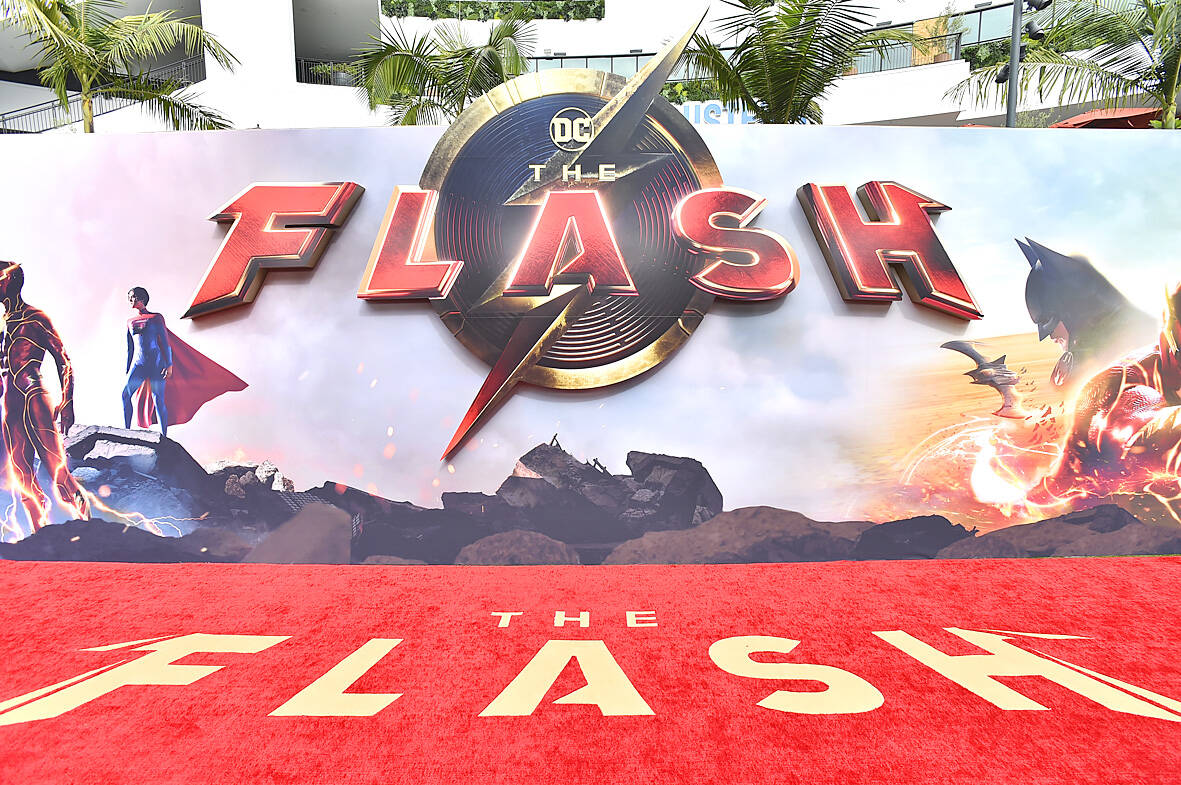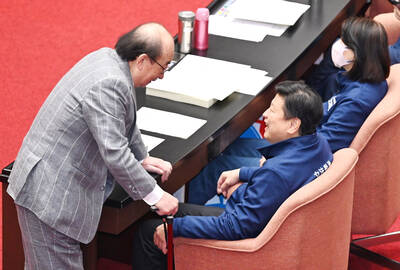“It’s not nice to fool Mother Nature,” went a famous ’70s commercial catchphrase. But we learn in The Flash — the much awaited, long gestated new DC Studios offering — that it’s Father Time one musn’t cross. Because trying to change the past can really mess you up when you get back to the future and realize you’ve inadvertently changed that, too.
But of course, we already knew that. We learned it from Marty McFly, immortalized by Eric Stoltz in Back to the Future.
Relax! Of course it was Michael J. Fox, though Stoltz was initially cast in the role. But in The Flash, Barry Allen (Ezra Miller) realizes just how badly he’s messed up the space-time continuum when he arrives back from changing the past — just one teensy little thing, really — and learns that in his current world, Fox never replaced Stoltz. “I’ve destroyed the universe,” he frets in a laugh-out-loud moment.

Photo: REUTERS
If only the whole film, directed by Andy Muschietti and written by Christina Hodson, felt this breezily clever and entertaining. Alas, the final act bogs down in what feels like an endless, generic CGI battle and a kitchen-sink resolution that leaves one feeling just a little exhausted and somewhat confused.
We first meet Barry — Miller, whose naturally jittery energy is an excellent fit here — on the way to his job at a forensics lab, stopping to order breakfast. But then he gets a call from Alfred — yes, you know the one — needing his help in an imminent disaster. Barry turns into his red-suited alter-ego but desperately needs calories for fuel, begging a bystander for her candy bar.
Soon, in a rescue scene that’s audacious but also a little absurd, Barry is saving falling newborn babies from a collapsing hospital while desperately eating snacks. He also saves a maternity nurse — then suggests she seek the help of a mental health professional to cope with the trauma, noting “the Justice League is not very good at that yet.”

Photo: AP
And now we must take a moment to consider the elephant in the room. Because it sure seems the movie wants us to.
If you’ve been reading about Miller lately, you know about the talented actor’s offscreen troubles. They’ve apologized for past behavior and said they’re undergoing mental health treatment.
So it hardly seems the line to the nurse is a coincidence, even if much of the trouble emerged during lengthy post-production. Could this be a subtle plea for empathy, so we can then appreciate what is, certainly, a compelling performance from Miller as not one, but two lead characters (why two? We’re getting to that.)

Photo: AFP
In any case, that line also sets a tone for many self-referential quips and sequences in a film that seems to thrive on, well, referring to itself and its roots. In this, the first standalone Flash film, the lineage of past Batmans, Supermans and associated characters is evoked early and often through surprise cameos. At one moment it feels like we’re watching an Oscar memorial reel; it garnered reverential applause at the screening I attended.
But back to the plot: Barry needs food, but what really powers him is the tragic murder of his mother (Maribel Verdu) in their home when he was a boy. Even worse, his father (Ron Livingston) is imprisoned — unjustly — for the crime.
Barry, desperate to prove his father innocent, suddenly discovers a way to go back in time (technical details are sparse, but it partly involves running REALLY fast) and comes up with a grander idea still. What if he could go back and prevent the whole sequence of events that led to his mother’s death? His friend and current Batman (the Ben Affleck version) tells him what a bad idea this is.
But Barry goes back anyway and makes a change, and what do you know — oops! – a younger Barry shows up (you may have seen them both in the trailer.) And now, for reasons too tough to explain within our word limit, Barry senior is potentially stuck in the wrong universe, with Barry junior.
What’s more, villainous General Zod (Michael Shannon) has returned, threatening total destruction. The Barrys need help. That’s how we find them with Michael Keaton’s Bruce Wayne, analyzing a pack of spaghetti.
It’s Keaton, having a fine time in his return as a graying, reluctant superhero, who explains the whole multiverse thing, showing with a deft manipulation of pasta strands how the past can’t change without the future changing. It all ends up with a gaggle of crazy spaghetti drowning under a shower of tomato sauce: a hot mess.
And we haven’t had time to mention Supergirl — newcomer Sasha Calle, who doesn’t get much to do before the battling starts, but at least provides some minimal female presence. Kiersey Clemons as a vague love interest has even less to do.
At one point in this 184-minute drama, I started wondering if I was seeing a bunch of disco balls trying to destroy each other. But maybe this was a moment of sensory overload.
Is a sequel in the offing, if the stars align offscreen as well? They’d have to come up with even more cameos, more surprises. Speaking of surprise: it’s probably never a good idea to leave while the credits are still rolling.
But again, we already knew that.

Taiwan doesn’t have a lot of railways, but its network has plenty of history. The government-owned entity that last year became the Taiwan Railway Corp (TRC) has been operating trains since 1891. During the 1895-1945 period of Japanese rule, the colonial government made huge investments in rail infrastructure. The northern port city of Keelung was connected to Kaohsiung in the south. New lines appeared in Pingtung, Yilan and the Hualien-Taitung region. Railway enthusiasts exploring Taiwan will find plenty to amuse themselves. Taipei will soon gain its second rail-themed museum. Elsewhere there’s a number of endearing branch lines and rolling-stock collections, some

The Democratic Progressive Party (DPP), Chinese Nationalist Party (KMT), and the country’s other political groups dare not offend religious groups, says Chen Lih-ming (陳立民), founder of the Taiwan Anti-Religion Alliance (台灣反宗教者聯盟). “It’s the same in other democracies, of course, but because political struggles in Taiwan are extraordinarily fierce, you’ll see candidates visiting several temples each day ahead of elections. That adds impetus to religion here,” says the retired college lecturer. In Japan’s most recent election, the Liberal Democratic Party lost many votes because of its ties to the Unification Church (“the Moonies”). Chen contrasts the progress made by anti-religion movements in

Could Taiwan’s democracy be at risk? There is a lot of apocalyptic commentary right now suggesting that this is the case, but it is always a conspiracy by the other guys — our side is firmly on the side of protecting democracy and always has been, unlike them! The situation is nowhere near that bleak — yet. The concern is that the power struggle between the opposition Chinese Nationalist Party (KMT) and their now effectively pan-blue allies the Taiwan People’s Party (TPP) and the ruling Democratic Progressive Party (DPP) intensifies to the point where democratic functions start to break down. Both

This was not supposed to be an election year. The local media is billing it as the “2025 great recall era” (2025大罷免時代) or the “2025 great recall wave” (2025大罷免潮), with many now just shortening it to “great recall.” As of this writing the number of campaigns that have submitted the requisite one percent of eligible voters signatures in legislative districts is 51 — 35 targeting Chinese Nationalist Party (KMT) caucus lawmakers and 16 targeting Democratic Progressive Party (DPP) lawmakers. The pan-green side has more as they started earlier. Many recall campaigns are billing themselves as “Winter Bluebirds” after the “Bluebird Action”